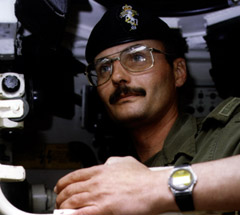|
"We repair, modify and inspect all land weapons in the Canadian
armed forces. That goes right from a little .22 to the big guns
the artillery uses," Kipp explains.
All weapons
technicians maintain and repair small arms. They work on larger,
more specialized weapons systems according to their abilities
and postings.
On base, weapons
techs can carry out their duties in workshops, while in the field
they may face very challenging conditions.
Because of
the wide range of equipment the technicians see - and the sheer
number of things that can go wrong - the work is varied.
"As the equipment
gets older, certain parts break down," Kipp explains. "With older
weapons, someone's always seen the problems before, so you know
how to repair them. With newer equipment you've got to do a lot
of troubleshooting - that's where your training comes in."
Weapons technicians
work on electrical and electronic as well as mechanical systems.
Electrical components play a crucial role in some of today's systems
- like the new Coyote reconnaissance vehicle, whose gun is fired
electrically.
|


